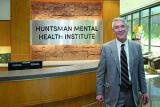We are facing a mental health crisis among children and adolescents.
A recent joint statement from the American Academy of Pediatrics, the American Academy of Child and Adolescent Psychiatry, and the Children's Hospital Association drove home the severity and scale of what we are now facing. The overarching message is clear: we are in a record, mental health pandemic.
Problems with child and adolescent mental health are not new. We have been in a crisis for years: 75% of mental disorders have their onset between the ages of 10-24. But the unprecedented challenges of the COVID-19 pandemic have pushed our mental health challenges to a new level:
- Suicide is now the second-leading cause of death among people ages 10 and 24. In Utah, it's the leading cause.
- More than 140,000 children in the United States have lost a primary and/or secondary caregiver during the COVID-19 pandemic.
- Mental health disorders are the number one source of disability worldwide, more than cancer or heart disease.
Children of every age have been denied important socialization in the past two years. While this isolation and distancing may have been necessary for slowing the spread of the coronavirus, these steps also intensified the mental health challenges children were already facing, making it front-page news all across the country.
The best way to think of the mental health challenges brought on by COVID-19 is as a second pandemic. It affects all of us.
Furthermore, data are clear that experiencing adverse mental health in childhood leads to increased anxiety disorders, more substance abuse problems, and a higher risk of suicide. We also see increased long-term health problems, like heart disease, cancer, diabetes, and obesity. In other words, mental health challenges not only impact the brain but can harm the entire body.
The particular struggles of children and teenagers are on the surface thanks to this important declaration, but everybody everywhere will continue to be impacted by these two pandemics.
Fortunately, as we consider how to address this critical challenge, there is room for hope. Here in Utah, we have seen a major increase in youth using the SafeUTapp over the past two years. Although the complexity of the problems has increased over time, students are finding the right resources to help.
The AAP-AACAP-CHA declaration calls for a comprehensive program of strengthening efforts, addressing challenges, and funding reforms. At Huntsman Mental Health Institute, we are already working on many points outlined in that powerful statement.
We have sophisticated resources for youth, including comprehensive assessment and treatment programs and day treatment programs that include teachers, so students don't fall behind on their education while getting well. We are working carefully with the University of Utah and other partners to build a curriculum for schools that will bring a deeper understanding of brain function to students to help erase the stigma of discussing mental health.
Early intervention is key to improving access for children and young people. Through new care models, research like the ABCD Study focused on child brain development, and research that uses technology like AI to help us understand risk trajectories in children, we will soon be able to draw better conclusions and better prevent mental health and brain disorders.
However, the most critical work in addressing this mental health crisis must happen at home.
Parents and caregivers should communicate as openly as possible with their children. In some cases, this may be more of a challenge for the adults; one of the wonderful things we have seen in recent years is a normalization among youth in talking about mental health.
Opening those dialogues will let children know it is okay to talk about feelings with their parents. It will also reinforce among kids that those feelings of depression or anxiety are not character flaws or personality issues.
The mental health declaration is an opportunity for everyone to understand the urgency of this overwhelming emergency crisis. In our communities, we need to acknowledge these problems and work together to resolve them.
Above all, the child and adolescent mental health crisis is a fight we must win for the welfare of future generations of our country.
Visit Huntsman Mental Health Institute to learn more or get help for your child or teen, and download the SafeUT app to connect to crisis counselors through secure calls and chats, 24 hours a day, 7 days a week, 365 days a year.
Mark Rapaport, MD is the inaugural CEO of the Huntsman Mental Health Institute and Chair of the Department of Psychiatry at University of Utah School of Medicine. Previously, Rapaport was head of psychiatry at Emory University in Atlanta, where he co-founded the Emory Brain Center.


